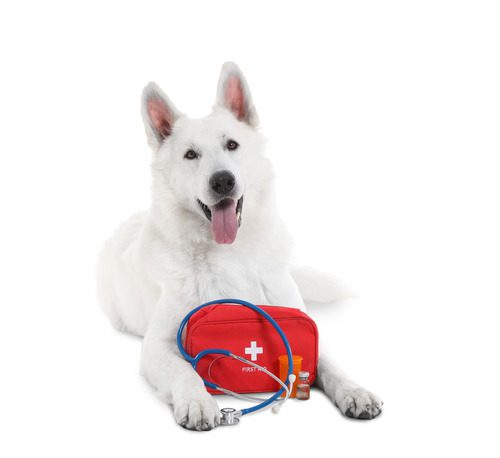Dog Seizures: Everything Pet Parents Should Know
Have you ever seen your dog have a seizure? If so, you already know how scary this sight can be, especially if it’s the first time. Unfortunately, many dogs in Highland, Westville and Mishawaka are prone to seizures and even suffer from epilepsy, so it’s not too uncommon for dogs to have this issue at least once in their lives.

In this article, we’ll explain everything you need to know about your dog’s seizures. With the help of this information, you can figure out when it’s time to talk to your vet about your dog’s condition. Remember to always follow your vet’s advice regarding your dog’s seizures.
Common Causes of Dog Seizures
Below are 5 common causes of dog seizures:
Epilepsy
Being by far the most common cause of seizures in dogs, epilepsy is a disorder that sometimes causes the brain’s electrical impulses to fire incorrectly. It can cause both generalized and focal seizures, and these may vary depending on the specific instance.
Generalized seizures are also known as grand mal seizures and are considered the more severe type of seizure. They are most commonly associated with epilepsy but can also be caused by other factors.
Focal seizures affect just one part of the body and are less common than generalized seizures, although both can occur with epilepsy.
Toxicity
Dogs in Highland, Westville and Mishawaka who ingest toxic substances may suffer from seizures as a result of the buildup of poison within the body.
Kidney, Liver, or Brain Disease
All of these types of diseases can lead to seizures as a symptom, although they are more commonly associated with brain disease and brain cancer than with other organ diseases.
Head Injury
If your dog suffers from a head injury, this could lead to seizures as a result of bleeding and damage to the brain.
Birth Disorders
Some dogs are born with diseases or disorders that increase their risk of seizures.
Symptoms of Seizures in Dogs
As a pet parent, it’s important to know the symptoms that indicate when your dog is having a seizure so that you know when you need to take them to the vet or emergency vet in Highland, Westville or Mishawaka, IN.
Symptoms of dog seizures include, but aren’t limited to:
Sudden Collapse
If your dog suddenly collapses without warning, this is a sign that they may be suffering from a seizure. You should watch them closely, however, as there are other causes that may contribute to sudden collapse, and some are emergency situations.
Twitching and Jerking Motions
Just like humans, dogs may twitch or jerk during seizures. They may also chew or bite during their episode.
Treading Water (or Look as Though They Are)
Dogs may paddle their feet and look like they are treading water while suffering from a seizure.
Loss of Consciousness
Many dogs lose consciousness temporarily during a seizure. As long as this symptom doesn’t last more than a minute or so, it isn’t an emergency. Loss of consciousness that lasts several minutes during a seizure constitutes an emergency, however.
No matter how long your dog loses consciousness for, you should still consult with your veterinarian in Highland, Westville, or Mishawaka.
Uncontrollable Urination or Defecation
Most dogs will not be able to control their bladder or bowels during a seizure and will accidentally go to the bathroom in the house.
Confusion
Before, during, and after a seizure, dogs will be confused and disoriented. They may not recognize you, so approach your dog gently and cautiously during this time.
Lethargy
Particularly after a seizure, dogs may be very lethargic and may be unable to stand up, eat, or drink. Don’t force your dog to do any of these things, but place their food and water nearby so they can get to them when they’re ready to do so.
5 Possible Treatments for Dog Seizures
Now that you know about the common causes and symptoms of dog seizures, it’s a good idea for you to be aware of different possible treatment options for this condition.
5 potential treatment options for dog seizures are:
Monitoring
Some veterinarians and emergency vets in Highland, Westville and Mishawaka will not automatically prescribe seizure medication for dogs who have epilepsy, especially if they only have a few seizures now and then. In this situation, it may be best to simply monitor your dog moving forward.
Cooling
Keep your dog cool during a seizure. Place cool cloths on your dog’s paws and turn a fan or air conditioner on them so they can feel cool while they recover.
Calming
Speak gently to your dog during the seizure, but don’t pet them. They may not recognize you and may be afraid, which could lead to accidental biting. They may also be unable to control themselves and could bite because of this too.
Emergency Treatment
If your dog has a seizure that lasts longer than five minutes or has several seizures in a row, they will need emergency vet treatment. This may include IV medication to stop the seizures and reduce the risk of brain damage.
Medication
Dogs who have frequent seizures and are diagnosed with epilepsy may be good candidates for seizure medication.
Call Us Right Away for Your Dog’s Seizures
Now that you’ve learned a few things about dog seizures, you should be better equipped to talk to your vet about your dog. If your dog is diagnosed with epilepsy, your vet may recommend a seizure medication to help keep the problem under control. If your dog’s seizures are caused by another issue, your vet can help you figure this out, too.
For more information about dog seizures, or if your dog is suffering from this condition, contact our team at Emergency Veterinary Care Centers right away. We have 3 locations in Highland, Westville and Mishawaka, all staffed with compassionate and expert teams who will work on getting to the underlying cause of your pet’s condition.
Recent Posts
Lyme Disease in Dogs: A Complete Guide for Pet Owners
Lyme Disease in Dogs: A Complete Guide for Pet Owners Discovering that your dog may be at…
Parvo in Dogs: What it is, Symptoms and How to Protect Your Pet
Parvo in Dogs: What it is, Symptoms and How to Protect Your Pet Parvovirus in dogs, commonly…
6 Common Pet Emergencies in Westville, IN
6 Common Pet Emergencies in Westville, IN When your pet faces an emergency, knowing what to expect…
My Dog Ate a Corn Cob, What Should I Do?
My Dog Ate a Corn Cob, What Should I Do? Discovering your dog has eaten a corn…
What To Know about Chocolate Poisoning in Cats and How to Protect Them
What To Know about Chocolate Poisoning in Cats and How to Protect Them Chocolate is a treat…






